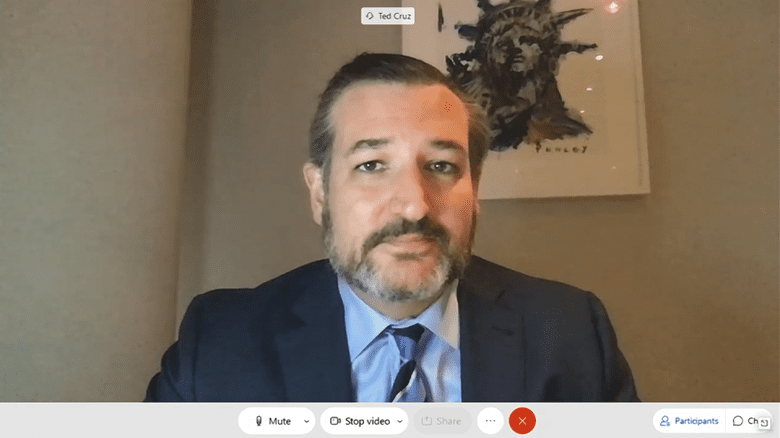When the Senate Judiciary Committee convened to begin confirmation hearings on the nomination of Amy Coney Barrett to the U.S. Supreme Court, Texas’ Ted Cruz provided an opening statement to address her qualifications and the importance of the hearing. His comments are printed here:
“Thank you, Mr. Chairman. Good morning. Welcome. Welcome to Judge Barrett, welcome to your family, welcome to your beautiful children who are here with you today. I want to start by making some observations about what we’ve heard at this point. At the very beginning let me observe as Sherlock Holmes famously observed that what speaks the loudest is the dog that didn’t bark, which is to date of every Democrat who’s spoken, we’ve heard virtually not a single word about Judge Barrett.
“We’ve heard a lot of attacks at President Trump. We understand our Democratic colleagues are not supporters of the president. We’ve heard a lot of political rhetoric. We just heard the Senator from Rhode Island directing some attacks at Senator Cornyn from Texas. And I understand there’s an election in a few weeks so those political attacks are not surprising. But we’ve heard very little about the nominee who is here and whose confirmation we’re considering. And I think part of the reason for that is that on any measure Judge Barrett’s credentials are impeccable. This is a woman who graduated number one in her class at Notre Dame Law School. I’d venture to say that there is likely not a single member of this committee who graduated number one in their class in law school. Perhaps my colleague Mike Lee can disagree with that statement but it is a very impressive accomplishment. Judge Barrett went on to be a clerk to the great Justice Antonin Scalia, one of the greatest justices ever to serve on the Supreme Court. We heard celebration from Senator Leahy about the fact that he was confirmed 98 to nothing. From there she became a law professor for two decades at Notre Dame Law School teaching the law to her students where she was beloved, where she was respected, where she was a serious, careful scholar. And now she is one of the most respected Federal Court of Appeals judges in the country.
“None of the discussions from our Democratic colleagues addressed any of that. Because those credentials are on their face impeccable. Indeed, the American Bar Association, which typically leans hard Left and has a long pattern of favoring Democratic nominees over nominees appointed by Republican presidents, had no choice but conclude that she was well qualified as a majority of the revealing board did. Judge Barrett’s qualifications are remarkable and I believe she will serve as an excellent Supreme Court Justice.
“So what is it that our Democratic friends have focused on? Well, one thing they’ve focused on is history. And they claim the fact that this nomination is occurring at all is illegitimate. Doesn’t matter who Judge Barrett is. Doesn’t matter what she’s done. Doesn’t matter her record. Doesn’t matter her extraordinary family story of doing all of this while being a mom to seven kids.
“The timing of the nomination, our Democratic friends tell us, makes it illegitimate.
“Except for that history does not accurately reflect what the Senate has done [for] over two centuries. This question of what happens when there’s a Supreme Court vacancy during a presidential election year — 2020 is not the first time America has faced that question.
“Indeed in our country’s history, that question has come up a total of 29 times. So 29 times presidents have faced the same circumstance and presidents have nominated individuals to fill those positions all 29 times. One hundred percent of it — doesn’t matter if you’re a Democrat or a Republican. From a president’s perspective it’s easy: if there’s a vacancy, even during a presidential election year, you make a nomination.
“Forty-four individuals have served as president throughout the history of our country. Half of them — 22 of the presidents we have had — have made Supreme Court nominations for vacancies that occurred during a presidential election year.
“But what has the Senate done? Well again, the Senate precedent is quite clear and is something that our Democratic friends do not want to address [and] do not want to confront. Of those 29 times, 19 of them occurred when the president and the Senate were of the same party. And when the president and the Senate are of the same party history shows that those nominees get confirmed. Seventeen of those 19 were confirmed for vacancies that occurred during a presidential election year.
“On the other hand, for those doing math at home, the remaining 10 occurred when the Senate and the president were of different parties. When the president and Senate are of different parties, the Senate over history has confirmed only two of those 10 nominees.
“Again history is clear: the overwhelming majority of instances that the president and Senate are of different parties, that nominee doesn’t get confirmed. That is of course what happened with Judge Garland, nominated by President Obama. President Obama was a Democrat, the Senate was in Republican hands and following [the] tradition of 200 years, the Senate did not confirm that nominee.
“Now, some might think the difference between whether the Senate and the president are of the same party or different party, that that’s just a question of partisan alignment [or] of partisan power. But that actually misunderstands the constitutional structure. The Framers of the Constitution deliberately set up a system of checks and balances so that nobody can become a Supreme Court nominee without both the president and the Senate. Each was designed to check the other. That system of checks and balances limits power ultimately and protects the voters. And indeed the voters made a clear choice.
“One of the things that is clear from this discussion this morning is Democrats and Republicans have fundamentally different visions of the Court. Of what the Supreme Court is supposed to do, what its function is. Democratic senators view the Court as a super-legislature. As a policymaking body. As a body that will decree outcomes to the American people.
“Now that vision of the Court is something found nowhere in the Constitution. And it’s a curious way to want to run a country. Even if on any particular policy issue you might happen to agree with wherever a majority of the Court is on any given day — who in their right mind would want the United States of America ruled by five unelected lawyers wearing black robes?
“It’s hard to think of a less democratic notion than unelected philosopher-kings, with life tenure, decreeing rules for 330 million Americans. That is not in fact the Court’s job. The Court’s job is to decide cases according to the law and to leave policymaking to the elected legislators.
“Now look, that doesn’t mean policymaking is unimportant. In fact, it means to the contrary, policymaking is very important. And the people need to have a direct check on policymaking.
“You know what if a rogue Court implements policies you don’t like, you the American people have very limited ability to check them. If a rogue Congress implements policies you don’t like you have a direct ability to check us by throwing the bums out and voting them out and voting in new representatives.
“Much of the argument this morning has concerned Obamacare. They’ve been policy arguments. Policy arguments that are actually occurring in the Senate, which is the right place for them to occur, a legislative body. But our Democratic colleagues simply want a promise from a judicial nominee, that this nominee will work to implement their policy vision of healthcare.
“That is not a judge’s job. That is not the responsibility of a judge. In fact, making that promise would be violating the judicial oath.
“I don’t know what will happen in this particular litigation on healthcare, but I do know that this body should be the one resolving the competing policy questions at issue.
“Many of our colleagues talked about pre-existing conditions and I think they have made a political decision: they want this to be the central issue of the confirmation.
“Well, remember this, every single member of the Senate agrees that pre-existing conditions can and should be protected. Period. The end. There is complete unanimity on it.
“Now, it so happens that there are a number of us on the Republican side that also want to see premiums go down. Obamacare has caused premiums to skyrocket. The average family’s premiums have risen over $5,000 a year. Millions of Americans can’t afford health care because of the policy failures of Obamacare.
“Those questions should be resolved in this body — in the elected legislature. It’s not a justice’s job to do that. It’s not the Court’s job to do that, it is the elected legislator’s job to do that.
“Judge Barrett brings impeccable credentials and judicial temperament and a faithfulness to the law. That’s what we should be looking for in Supreme Court justices. If Democratic senators want to engage in policy arguments, they can do so here, not by filibustering every bill as they have done over and over and over again. Whether it’s pandemic relief or Obamacare relief to lower premiums and expand choices. To date, our Democratic colleagues filibuster everything and then complain nothing gets passed. This is the body that has to resolve those questions.
“This is also the body that consistent with two centuries of precedent can, should, and I believe will confirm Judge Barrett as Justice Barrett. Thank you.”





